Sacramento’s first Black woman-owned cannabis dispensary opens in midtown
Two years ago, Sacramento native Kynndal Cornelius placed an online order for cannabis delivery with Crystal Nugs and, upon arrival, she asked her delivery driver if they were hiring.
She immediately followed up with an email and was later interviewed to become a driver; she was hired on the spot.
Cornelius still works for the same company, but now she is a budtender at its dispensary that opened last month at 2300 J St. in midtown Sacramento.
“I like it here,” Cornelius said. “I get to just be myself and talk to just anyone that comes through those doors.”
Crystal Nugs is a local Black-owned, woman-owned and family-owned business in Sacramento that operates as both a full-functioning delivery service and, now, a storefront.
It is the city’s first Black woman-owned cannabis dispensary, according to the Sacramento Black Chamber of Commerce, of which Crystal Nugs co-owner and CEO Maisha Bahati is also a board member.
From the moment the building was purchased, Bahati had a clear vision for a top-of-the-line dispensary to service midtown. Bahati is joined in ownership by her husband Chris Lofton and their friends, Melina and Bryan Brown.
There were moments when people questioned how they would afford the building and costs of operations, Bahati said, but they “figured it out” after a highly anticipated and drawn-out process.
“It’s tremendous really because you see all the hard work and stuff that we’ve done and what we put in over the last five to six years of trying to get into this industry where we cracked in with the delivery, and we’ve done it all by ourselves, just the four of us,” said co-owner Bryan Brown. “Two couples just making it happen.”
Once locked into their space, Bahati had specific goals in mind: destigmatize cannabis and transform the block.
After check-in with security at the help desk, when customers walk through the doors and head up the steps to the venue, they see the different art pieces on the wall including a “City of Trees” water tower image, artwork of a Black woman smoking marijuana near Tower Bridge drawn by Sacramento artist Courtney Brignac and more.
“We wanted something that was going to be welcoming. We wanted to destigmatize cannabis,” Bahati said. “Part of that was within our interior…within our experience. We wanted employees to be a part of this team who were empathetic, who were caring, who were relaxing to talk to you – we got that, so we have an amazing staff.”
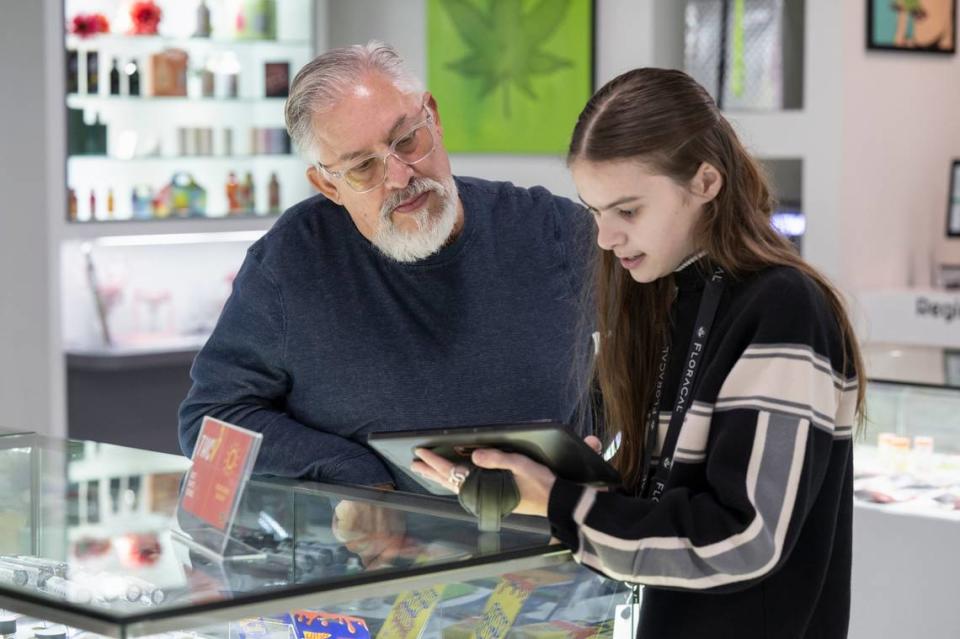
Bahati cried on the day of their grand opening in November. It was a drenching wet Saturday from rain that poured nearly all day, yet people still showed up to grab their purchases and support the newly opened cannabis storefront.
The brick-and-mortar site has been operating for a little over a month, and Bahati has been appreciative of the patronage that Crystal Nugs has received.
“It’s been really good. We haven’t really done any marketing so it’s been just organically grown. We’ve already hit 400 reviews (on Google Reviews). People are excited,” Bahati said. “We have good relationships with our neighboring businesses, so we’re all kind of promoting one another. Lots of people who’ve come in have said, ‘I’ve just seen you guys working on this for years. It’s finally open.’”
‘By far the hardest thing’
Bahati has been dreaming of this moment since recreational marijuana was legalized by California in 2016.
By no means was Crystal Nugs an overnight success.
“The whole time you’re trying to get through and stay positive; in the back of your mind you’re thinking, ‘OK, how I’m gonna do this?’ I need $150,000 in seven days, how are we going to do that? So that was constantly on our minds,” Bahati said. “What we didn’t want to happen was to start a project and you didn’t have the funds and you can’t finish, and that was happening a lot in the cannabis industry…the funding doesn’t work out and now you’re just out of the game. And so that was a fear of mine.”
Bahati said they had to scrap their way to get where they are. Every step of the way, they were frantically pacing looking for ways to come up with the money to handle financing to open the storefront, all while maintaining their delivery service.
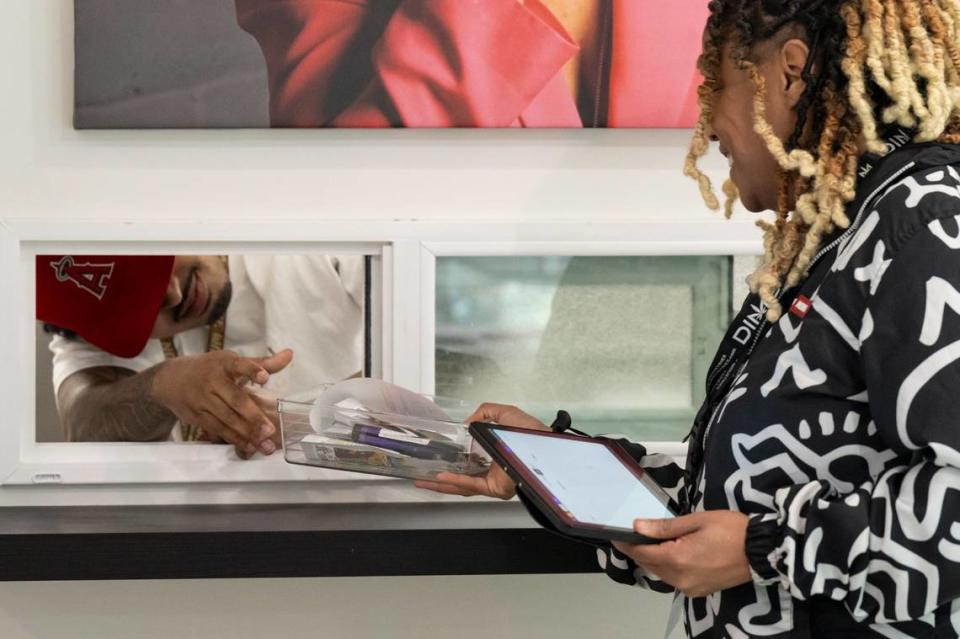
“No one knows the degree of barriers and work it took. This was by far the hardest thing,” Bahati said. “This was an emotionally, financially, mentally and physically draining process.”
They found themselves still needing $400,000 mid-construction of the building in May 2022.
They juggled the idea of partnering with another entity, Bahati said, but outside investors wanted more equity than Bahati and her partners were willing to give.
They considered taking out loans, but interest rates were hovering around 29%, she said. In addition to the building, they still needed to purchase displays, obtain licensing and hire security.
It was becoming increasingly overwhelming for Bahati, and there were moments when she didn’t think it would happen. The thought of it sent her into a mild depressive state.
She said she didn’t want to be known as the “Black girl who couldn’t make it happen” after gaining anticipation from the public.
Instead, the four owners got together collectively and sold everything they had of value – from homes and cars to retirement funds and bonds – in order to raise the money they needed.
“We said, ‘OK, what do we got? What do we have that we can make this happen? You got some bonds? Cash in on it,’” Bahati said. “We had an amazing, beautiful 2020 red Corvette. ‘Let’s sell it. Let’s cash in that retirement that you’ve been holding on to. Let’s pull from this crypto.’
“Thank God we had a good team that everybody was willing to take the risk. We were able to make it happen.”
Taking advantage of every opportunity
Bahati understands that a big lift for them was the implementation of the City of Sacramento’s Cannabis Opportunity Reinvestment and Equity (CORE) program in 2018.
According to the city’s website, the program’s initiative is designed to provide assistance and resources – such as support services, fee waivers and exclusive access to storefront permits – to help eligible individuals enter and succeed in the legal cannabis industry.
Bahati was immediately interested in Sacramento’s cannabis equity program, having followed similar programs in other jurisdictions such as Los Angeles, Oakland and San Francisco.
“I applied for both programs and the first cohort and I got accepted to both programs. I completed programs at the same time while working full time, while working delivery, while parenting my kids, so it was a lot,” Bahati said. “My goal when I got into it was not to open a business, but to obtain a dispensary.”
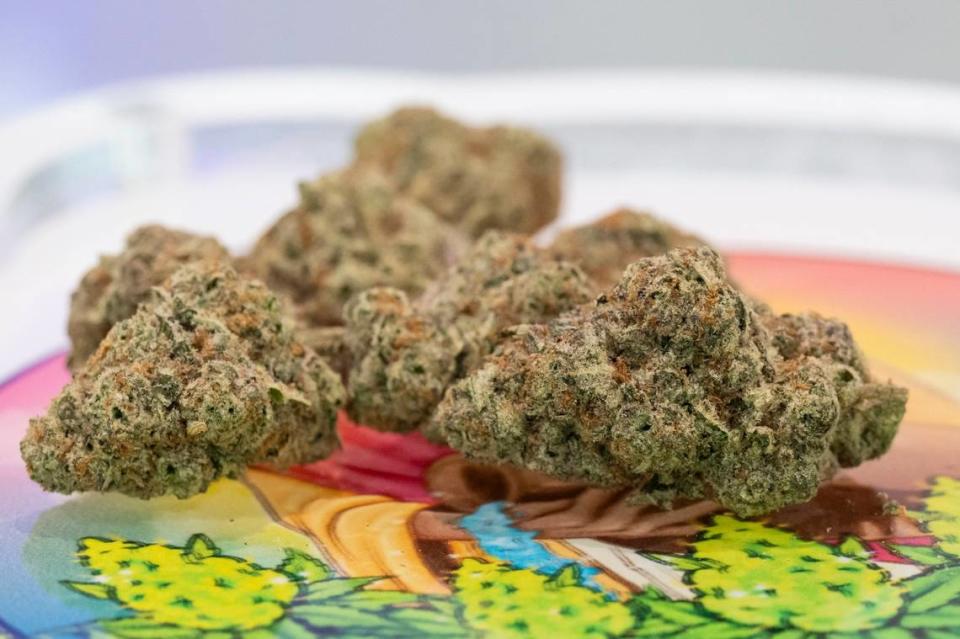
The conversation for dispensaries was not yet on the table, but Bahati didn’t seem to mind. She knew that eventually, it would be. And when it came time, she would be ready.
In the meantime, Bahati said they were able to take advantage of different benefits: banking; different promotions on WeedMaps, a website and app to help consumers locate and order cannabis for delivery or at a nearby dispensary; and business operating permits – which could cost up to $20,000 – were waived for up to a year.
Eventually, the city released 10 storefront dispensaries to exclusively CORE participants.
“It was a very competitive process. You had to basically submit a request for proposal, business plan and it was something that we wrote ourselves. That took us a year to write,” Bahati said. “We started writing that plan in March 2020, when we shut down for COVID... It was do or die for me; it was, ‘You got to get this opportunity, you have to make it to the next level.’”
Bahati and her partners were one out of 10 individual applicants selected to have priority to a storefront dispensary, after scoring the highest on the city’s permit request for qualifications.
“We were really in over our heads, but it was an opportunity that we didn’t want to miss because they were only handing out so many licenses and we (already) had our delivery,” said co-owner Melina Brown.
Bahati showed her gratitude toward the program and what it has been able to help her accomplish.
“It was an opportunity to get a storefront dispensary. I wouldn’t have been able to do that without the CORE program. It’s just that the industry is too locked up. There’s too many bigger entities that have bigger money that would have swallowed this one little small business away,” Bahati said.
Less than 10% were selected, as the CORE program’s storefront permit fielded over 100 applicants.
Bahati said she saw CORE as “an opportunity” and that she often heard people would say they wished the program had more funding to open businesses.
“I always said you have to take advantage of opportunities, big or small. If there’s a grant for $10,000, that’s $10,000 that you can use... I’ve always found a positive in whatever is being offered. So I use it to my advantage,” Bahati said. “It’s one of those programs where you have to be engaged. Without the CORE program, this would have been nonexistent to us.”
Vision for the future
One component of destigmatizing marijuana is allowing on-site consumption lounges for locations that have the safe space to do so.
Crystal Nugs has the space, and Bahati said she anticipates furthering discussions for social consumption.
“As it stands now, it is illegal to consume cannabis anywhere,” Bahati said. “Sacramento is a social town. Midtown and downtown, there’s a lot of social activities, bars and festivals and cannabis is there now. Cannabis is a social activity that a lot of people like to partake in. And if you can’t do it at your house, or you can’t do it at a hotel, where are you going to do it?”
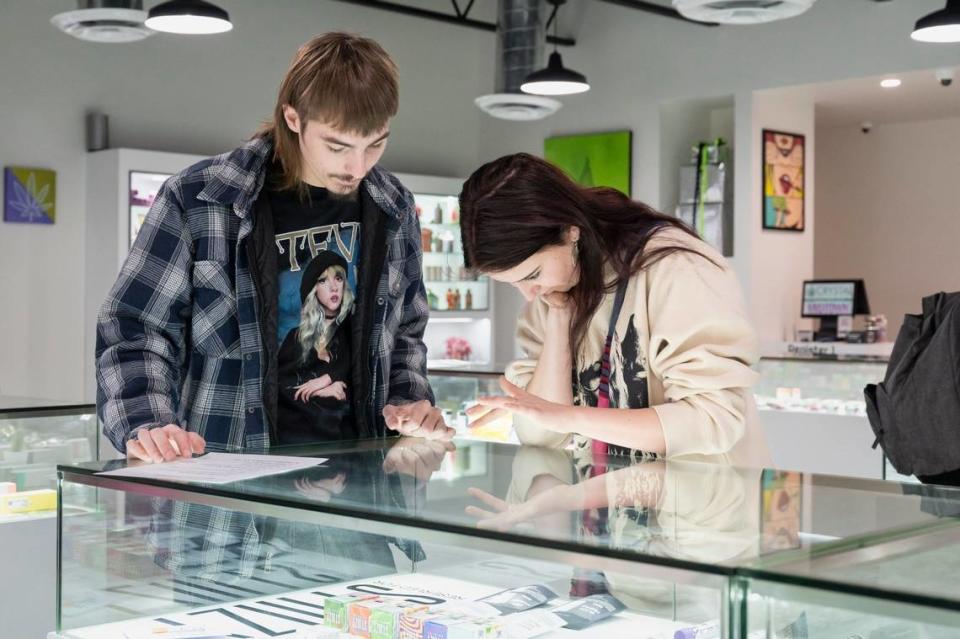
Sacramento City Council’s law and legislation committee chairwoman Katie Valenzuela has been a huge advocate for social consumption sites.
During a May 2023 interview with The Sacramento Bee, Valenzuela said “consumption lounges can offer a safe alternative for people to use cannabis.”
The Bee reported in September that councilmembers favored allowing onsite consumption lounges, as a part of a pilot program. Valenzuela expects a formal committee resolution to transpire in early 2024.
Bahati said that, if or when it is approved by the city, she would host events in her lounge – which is connected to her storefront dispensary. She said it’s the “missing piece” to help elevate cannabis businesses, and for Crystal Nugs to stand out.
“I think it’s the responsibility of the city if you’re going to allow for legal cannabis to be sold then you need to provide safe spaces for people to go to consume,” Bahati said. “People are into the more entertainment aspect of it. They want more than just coming in, purchasing cannabis and going home. Part of destigmatizing (marijuana) is becoming more social with it.”
Crystal Nugs budtender Paige Murray moved to Sacramento from New York because of California’s nation-leading ideologies about cannabis.
New York had recently legalized marijuana recreationally, but Murray decided she’d rather be in California where the legislation wasn’t as new.
Prior to moving to over 3,000 miles west, Murray became aware of Crystal Nugs, she said, by reading a Sacramento Bee story about how the business hopes to become the city’s first consumption lounge.
“At least six months before I even moved here, I saw this business, I started following them online and then after I got here there was a job fair and I made it down to Sac,” Murray said. “I was living up north in Oroville at the time and it just all felt like kismet the way it lined up. I got my house a couple blocks away; they had their opening right when I needed a job.”
Murray is excited for the opportunity to have on-site consumption lounges because she does creative rolling, where she has created joints in many different shapes such as a sword, guitar, mushroom and rainbow.
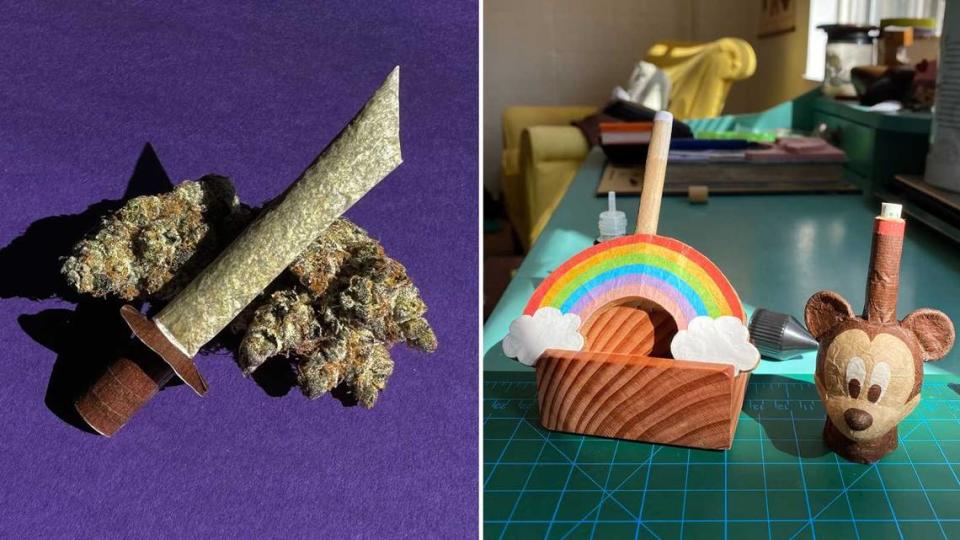
Some of her creations are on display at Crystal Nugs, but she hopes to utilize the lounge during events to roll for visitors.
Murray’s coworker, Cornelius, hopes to have an opportunity to show off her deejaying skills and curate sounds for the future events at Crystal Nugs’ lounge.
“In the future, it’s gonna just grow from here I think, especially when that lounge opens,” Cornelius said. “Man, it’s going to be popping.”
